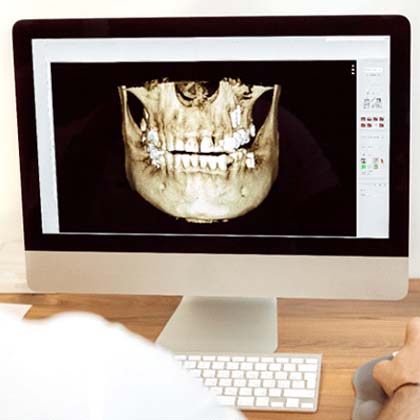Many patients who are missing teeth are good candidates for a modern tooth replacement treatment utilizing dental implants. Our team uses 3D technology and guided implant surgery as well as other high-tech methods to make the process faster and safer and minimize any risk of complications. To learn more about dental implants from our Lake Nona, FL dentist, we welcome you to call our dental office today to schedule a consultation with our team.
Dental Implants
Modern, State-of-the-Art Solutions for Tooth Loss
Why Choose Lake Nona Dental Group for Dental Implants?
- Start-to-Finish Dental Implant Treatment
- Precise Guided Implant Surgery
- High-Quality Imaging Technology
What are Dental Implants?
Dental implants themselves are small titanium posts that are surgically placed below the gumline to replace the missing root structure of teeth. Due to their biocompatible nature, they’re able to chemically fuse with the jawbone through a process called osseointegration. This provides the restoration (crown, bridge, or denture) with a sturdy foundation to be attached to. The result is unwavering prosthetics that provide you with unmatched benefits.
The 4-Step Dental Implant Process
While dental implants can help replace missing pearly whites similar to dental bridges and dentures, they do involve a multistep process that can take a few months to complete. Though this might seem lengthy, it’s all to ensure a much more stable and longer-lasting solution than other traditional tooth-replacement methods. Fortunately, our team also performs the entire process in-house, so you can be sure to work with a team you know and trust until you’ve rebuilt your full and healthy smile! Until then, here are the primary steps involved in the dental implant treatment.
Initial Dental Implant Consultation

Firstly, you’ll come to our office to undergo an initial consultation with our team, which will involve us taking X-rays of your mouth to help us determine whether you’re a good candidate for the procedure. If you are, we’ll create a treatment plan and walk you through it so you know what to expect throughout the rest of the process, including a cost estimate for the procedure.
Patients sometimes may not currently be eligible for the treatment and might require preliminary services to prepare their mouths, such as bone grafting, gum disease treatment, or even tooth extractions. Once you’ve properly recovered from any initial procedures, we can move forward with mapping out the process for placing your new pearly whites.
Dental Implant Surgery

Once you arrive for your appointment and are in the dentist's chair, our team will first completely numb your mouth with a local anesthetic so that you’re pain-free throughout your procedure. We’ll likely also provide you with sedation dentistry so that you can remain as relaxed as possible while undergoing your dental treatment.
After confirming that you’re comfortable, we’ll begin by making a tiny incision in your gums to get to your jawbone, where we’ll strategically place your dental implants at their preplanned locations and angles. Once this is finished, we’ll suture your gums closed around the posts and place protective caps over them so they can remain safe while you recover.
Dental Implant Osseointegration & Abutment

The next several months will be crucial for the success of your dental implant treatment. The metal posts will need to fuse with your jawbone through a process known as osseointegration, which will develop the stable foundation needed for your restorations to remain for decades to come. After you’ve recovered completely, you’ll receive your metal abutments, which are the small connector pieces that link your dental implants to your brand-new teeth.
Delivery of Dental Implant Restoration(s)

Once your gums have healed from placing your abutments, you’ll return to our office to receive your final restoration. Our team will place your new crown, bridge, or denture and confirm that your bite is as it should be. We’ll also verify that the results are to your satisfaction before sending you on your way to enjoy your full smile again!
Benefits of Dental Implants
Dental implants offer a wide array of unique benefits, which is what makes them such a popular treatment choice to replace missing teeth. Because they fuse with the jawbone and replace the entire missing root structure of teeth, your bone structure won’t deteriorate over time. This will also keep your facial appearance from changing and provide your restoration with a strong foundation to be attached to, making eating and speaking easy. Here are some of the common benefits you can expect to enjoy with dental implants.
Day-to-Day Benefits

- Natural-Looking Results: Due to advanced dental technology and custom-designed porcelain restorations, dental implants can perfectly mimic natural teeth. Most people won’t even be able to tell the difference.
- Improved Bite: While dentures and dental bridges typically come with certain food restrictions, dental implants can allow you to eat almost all of your favorite meals without having to worry about your teeth shifting out of place.
- Simple Maintenance: Since dental implants serve as new tooth roots, you’ll simply need to brush, floss, and rinse your new pearly whites as you do with natural ones.
Health Benefits

- Preserve Existing Teeth: Dental implants are embedded directly into the jawbone, meaning you won’t need to rely on other natural teeth for support. The metal posts also serve as placeholders and promote bone growth, meaning your other teeth won’t be at risk of moving out of place.
- Comprehensive Treatment: The metal posts will act as new tooth roots, stimulating the jawbone for healthy bone growth and structure. This can help maintain a sturdy foundation for your teeth as well as promote a more youthful facial appearance.
- Comfortable Restoration: While those with dentures or dental bridges can sometimes experience discomforts like gum sores or tooth sensitivity, patients who opt for dental implants often feel so comfortable with their restorations that it’s easy to forget they even have them in.
Long-Term Benefits

- Reliable Solution: Dental implants often come with a success rate of 95% or more. If placed by an experienced dentist, this treatment has been proven to have the same success even 10 years after having them placed.
- Long-Lasting Results: Dental bridges and dentures typically go for 10 years or more before needing to replace them. Dental implants, on the other hand, can easily last several decades to even the rest of your life with simple dental care. This also means you won’t need to replace your restorations as often, allowing you to save more money in the long run!
Who Dental Implants Can Help
Are you missing just one tooth? Have you lost multiple teeth in a row? Do you need to replace all of the teeth in your upper and lower jaw? Dental implants can be a viable option in all kinds of tooth loss situations. As such, if you have an incomplete smile, it’s worth scheduling a consultation with our team so that we can take a look at your mouth and determine whether or not dental implants are worth pursuing in your case.

Who Is a Good Candidate for Dental Implants?
The ideal dental implant candidate will be in good oral health and will have plenty of bone density in their jaw. It should be noted, though, that even people who don’t currently qualify for dental implants may still be able to have the procedure done if the right steps are taken.
Certain preliminary treatments can be performed to address any issues that may be standing between you and dental implants. Bone grafts are a common example, giving you a way to increase the bone density in the parts of the jaw where dental implants need to be inserted.
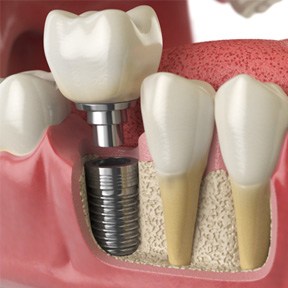
Missing One Tooth
A dental implant post can be carefully inserted into the gap in your smile where a missing tooth used to be. The post will need a few months to form a lasting bond with the jaw, but once it does, it can be used to support a crown. A dental implant post that has been restored with a crown looks and feels like a natural part of your grin; to the average person, it will seem as though you were never missing any teeth to begin with.
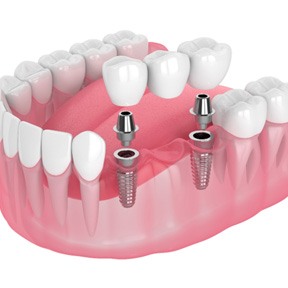
Missing Multiple Teeth
A dental bridge can be attached to a pair of dental implants in order to replace multiple missing teeth in a row. Unlike a traditional bridge that rests on natural teeth, an implant bridge doesn’t require the removal of any enamel; you can protect the dental structure that you still have while reclaiming a complete grin.
On top of that, patients who need to replace multiple teeth in different parts of the mouth may be able to get a partial denture supported by dental implants. The exact number of implant posts required for this form of tooth replacement can vary from case to case.
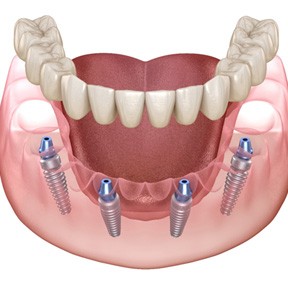
Missing All Teeth
Dentures can be attached to dental implants for additional strength and security. Not only will you not have to worry about your new teeth slipping out of place, but you will be able to eat all kinds of foods without issue. At our practice, we can replace an entire row of teeth with the All-on-4 procedure; this involves combining a customized full denture with four implant posts that have been placed in strategic parts of the jaw at carefully chosen angles.
Dental Implant Post-Op Instructions
At Lake Nona Dental Group, we’re able to complete the entire dental implant process from start to finish in one convenient location. That means you’ll have our friendly team right by your side every step of the way! Following your oral surgery, we’ll provide you with post-op instructions to help you make a speedy and smooth-sailing recovery. Below, we’ll briefly explain what to expect throughout the healing period and when you should contact our office for assistance.
What to Do Directly After Dental Implant Surgery

Recovering from dental implant surgery may sound daunting, but it doesn’t have to be! The most important you must do is ensure the forming blood clot on your surgery site remains completely untouched so the gums can heal properly. That said, you should avoid:
- Spitting (use tissues or swallow your saliva)
- Drinking from straws
- Smoking
- Touching the surgical site with your fingers or tongue
Common Side-Effects When Recovering from Dental Implant Placement

If you’ve never had oral surgery, you may not know which symptoms are normal and which ones you should be concerned about. While you’re expected to feel some discomfort, it should gradually disappear over time. If that’s ever not the case, don’t hesitate to contact our office for help.
Here are some common side effects you can expect in the first few days following dental implant placement:
- Intermittent Bleeding – Although this can last multiple days, you can alleviate it with gauze and light pressure.
- Swelling – This may last over a week, but you can help it go down more quickly by applying a cold compress to your cheek or jaw for 10 minutes at a time.
- General Discomfort – You can ease your discomfort by taking prescribed or over-the-counter pain medication as needed.
Your Diet After Dental Implant Surgery

For the first few days following dental implant surgery, it’s strongly recommended that you stick to a soft-food diet. Before your procedure, you should stock up on foods like:
- Mashed potatoes
- Yogurt
- Pudding
- Ice cream
- Scrambled eggs
- Pasta
You can return to your usual diet as soon as you feel up for it. Of course, we encourage you to avoid crunchy, tough, chewy foods and chewing directly on the implant site.
Post-Op Health & Oral Hygiene

After dental implant surgery, you must keep your mouth as clean as possible. It’s essential to ensure your implants successfully integrate with your jawbone. While you can brush your teeth as you normally would the day after your procedure, you should be extremely careful near the surgical site. Make sure you rinse your mouth two to three times a day with salt water, ideally after meals. Use prescription mouthwash if you have it. Otherwise, avoid using any brands with high levels of alcohol like Scope or Listerine.
What to Do After Your New Teeth Are Attached

Once you’re all healed up, you’re ready for the final step of the dental implant process – the attachment of your new teeth! You may experience mild sensitivity after your crown, bridge, or denture is placed, but it should be easily manageable with pain medication. After your appointment, you’ll be ready to make the most out of your fully restored smile!
Maintaining & Caring for Your Dental Implants
Even though dental implants have an impressive success rate of 90-95% after ten years, they’ll only last that long if you take proper care of them. Luckily, our team at Lake Nona Dental Group will walk you through the steps you need to take to ensure your new smile lasts a lifetime. After your procedure, we’ll talk to you in detail about the maintenance for your specific restoration. If you want to learn what you can do to care for your implants, continue reading or schedule an appointment with us today!
Make Oral Hygiene a Priority

It’s true that your dental implants can’t get cavities, but that doesn’t mean you can slack off on your oral hygiene. Problems like gum disease can still lead to implant failure. That said, you must establish a solid at-home dental care routine to keep your smile in optimal condition. Brushing your teeth twice a day, flossing daily, and rinsing with an ADA-approved mouthwash are excellent ways to keep harmful bacteria from attacking your soft oral tissues and causing potential tooth and bone loss.
Eat a Healthy Diet

Once your dental implants are firmly in place, you’ll regain the ability to eat all your favorite foods once again! That means it’ll be easier than ever to follow a nutritious diet. However, overindulging in hard, sticky, sugar, starchy, and highly processed foods can be problematic for your implants. Make sure you eat lots of fruits, vegetables, leafy greens, dairy, and lean proteins! Foods that are rich in calcium and vitamin C, in particular, are crucial to keeping your jawbone strong and gum tissues healthy.
Break Bad Habits

Smoking, biting your fingernails, using your teeth as tools, chewing on pens – are you guilty of any of these bad habits? Not only can they destroy your tooth enamel, but they can be detrimental to your implants as well. Do your smile a favor and kick these bad habits to the curb! It’s a good idea to keep some sugar-free gum in your pocket just in case you ever feel tempted to chew on your nails or a pencil. If you need help quitting smoking, our team will gladly provide you with resources, guidance, and support.
Protect Your Dental Implants

Dental implants are certainly strong, but they’re not indestructible. If you enjoy playing sports or mindlessly grind your teeth at night, you should ask about a custom-made mouthguard. It’ll protect your natural pearly whites and dental implants against any potential damage. Plus, you can avoid chronic jaw pain that can lead to temporomandibular joint disorder.
Schedule Regular Dental Checkups

Aside from brushing and flossing, you must visit us every six months for a checkup and cleaning to ensure there are no problems with your smile. We’ll monitor your dental implants, conduct an oral examination, and check for any developing issues to catch them before they progress. By addressing problems early on, you can avoid needing more extensive and costly procedures down the line.
Understanding the Cost of Dental Implants
Each dental implant procedure that we do is different, which is why there’s no set price associated with the treatment. Based on several factors that we’ll determine during your consultation, like how many dental implants you’ll need to have placed and whether you require any preparatory treatments, we’ll be able to give you a rundown of the cost to restore your smile. If you have any questions, please don’t hesitate to ask one of our friendly team members!
Preliminary Treatments & Dental Implant Surgery

Depending on what treatments you may need beforehand, your costs could be higher or lower. For example, if you need preliminary treatments to resolve existing dental issues, such as gum disease or tooth decay, this will increase your costs. The same applies for bone grafting to expand available bone tissue. Because we perform all phases of care in-house, you can expect the fees for your surgery, anesthetic, implant, and restoration to be more compact and convenient. You won’t need to worry about separate fees from an offsite oral surgeon. We’ll make sure you’re aware of the total costs of your care upfront.
The Parts of Your Dental Implant

The more implants you need to restore your smile, the higher your costs will be. This is by far the most influential factor in determining your final price tag. Dental implants use medical-grade titanium to replace the roots of teeth, but they can still come from different manufacturers. If you have questions about the implants we use, feel free to let us know and we’ll be happy to go over it with you one-on-one.
Final Dental Implant Restoration

More complex tooth replacement cases require more comprehensive restorations. On top of being made with lifelike materials, including dental ceramic, we design highly customized crowns, bridges, and dentures specifically to attach to dental implants. Larger restorations need more time, materials, and labor to fabricate, resulting in higher costs. A single crown won’t cost nearly as much as an implant denture designed to replace an entire arch of teeth.
Does My Dental Insurance Cover Dental Implants?

In most cases, dental insurance won’t cover the cost of dental implant treatment. Depending on the coverage within your plan, you may be able to get your insurer to pay for at least a portion of your dental implant treatment, including preliminary services or the restoration that covers the implant. Our team will gladly review the details of your plan to ensure you’re maximizing benefits to the fullest.
Making Dental Implants Affordable

There are other financial options available to you if you don’t have dental insurance or can’t afford to cover your costs out-of-pocket. Lake Nona Dental Group partners with several third-party financing solutions to make paying for dental services more manageable, including CareCredit, LendingClub, and Proceed Finance. These services let you pay for dental care in monthly installments over an extended period of time, typically with little to no interest attached. Alternatively, you can sign up for our patient membership plan to save on preventive treatments and receive discounts on services provided in-house.
Advanced Dental Implant Procedures
Every patient who wants to get dental implants in Lake Nona must have a healthy jawbone. After all, it’s the base for successful treatment! Since it’s the foundation, the jawbone must be durable enough to fuse and support a custom-made restoration. If your jawbone is not in good shape for dental implants, don’t worry – all you need is a bit of help to get the process started! At Lake Nona Dental Group, we offer advanced procedures like bone grafting and ridge expansion to get you ready for a new smile. To learn more about these treatments, continue reading or give our office a call today.
Bone Grafting
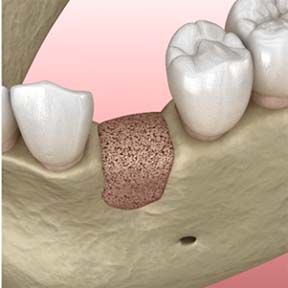
It’s incredibly common for the jawbone to deteriorate after tooth loss, mainly because there are no roots to stimulate blood flow. As a result, the jawbone is weakened and unable to support dental implants. There must be a solid foundation before dental implants are placed to ensure the procedure is successful.
During your consultation, our team will examine your jawbone to determine whether or not it’s in good shape. If there isn’t enough bone to support implants, we’ll recommend bone grafting in Lake Nona. It’ll help strengthen the jaw enough for dental implant placement.
Essentially, the process requires taking bone minerals from another area in your body (or a donor) and placing them into the weakened area of your jawbone. While this process can take several months, it’s necessary for the long-term success of dental implants. Once you’re all healed from the procedure, you can discuss the next step of the process towards a newly rebuilt smile.
Ridge Expansion
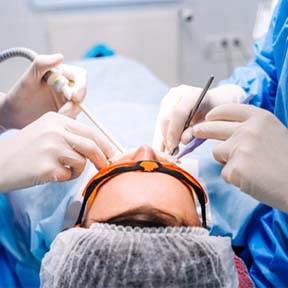
Is the problem that your jaw isn’t wide enough to support dental implants? Ridge expansion can help! It’s a common dental procedure that’s performed following a tooth extraction to help recreate the natural contour of the gums and jaw that may have been lost.
For this procedure, the ridge bone is divided, and the inner and outer segments of the bone are wedged apart. This creates a space between the divided sections that can be filled with a bone graft. Gum tissue is placed over the socket and secured with sutures to complete the process. Once you’ve healed, you’re ready to move forward with dental implant placement.
Dental Implant Technology
When choosing your implant dentist, there are many factors to take into consideration to narrow down the right one for you. Although skill and experience are certainly important, the technology used plays a significant role in the long-term success of your dental implants. The right tools can make your journey toward a fully rebuilt smile much smoother, more efficient, and low risk. Below, you can learn more about the incredible instruments we use at our practice.
3D Cone-Beam Imaging/ 3D CT Scanning
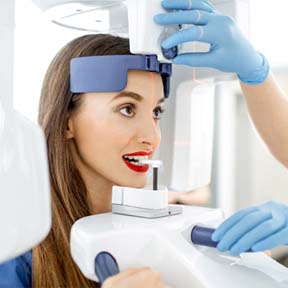
A traditional digital X-ray captures useful images of the jawbone and teeth that can be used for many different things. However, they do not provide the level of detail needed to plan a successful dental implant procedure. That’s where a CT scan comes in to save the day! At Lake Nona Dental Group, we use a Sirona 3D imaging system to produce highly detailed, three-dimensional images of a patient’s bone, teeth, nerves, and connective tissues. It allows for extremely precise dental implant placement. Best of all, the scanning process is quick, non-invasive, and completely painless!
E4D Digital Impression System
Long ago, traditional putty impressions were used to create restorations like crowns, bridges, and dentures. Although they were certainly effective, they required the use of messy materials that can be uncomfortable to bite down on. That’s why we take a different approach! When creating your restoration, we use a digital scanner to capture thousands of images of your teeth and gums. The system assembles those images into an accurate digital representation of your mouth. It helps us create natural-looking restorations that blend seamlessly with your remaining teeth.
ORTHOPANTOMOGRAPH OP300 Maxio from Instrumentarium Dental

An Orthopantomograph® OP300 Maxio is an advanced panoramic, cephalometric, and 3D extraoral imaging system. Essentially, it’s a combination of advanced panoramic imaging and 3D cone beam technology. It offers precise and agile 3D imaging for highly accurate and convenient treatment planning. By using it, our team can place dental implants faster and more accurately than ever before. The machine is fast and doesn’t require uncomfortable positioning, ensuring patients get a comfortable and convenient experience.
Dental Implant Failure & Salvage
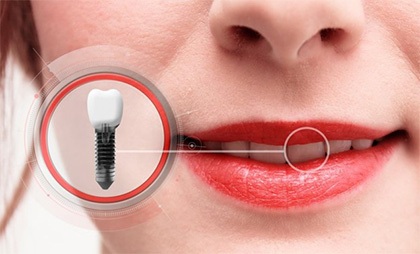
One of the main reasons why dental implants in Lake Nona are incredibly popular is because they have an impressive success rate. Of course, there are still the few rare instances where dental implant failure occurs. While it’s often because of infection or trauma, there are many different things that can cause it. If your implants ever feel loose or uncomfortable, your newly rebuilt smile may be in danger. Don’t hesitate to give our office a call! We can restore your oral health and get you the relief you need with dental implant salvage treatment. Read More

Dental Implant FAQs
After reading the information above, you now have a better understanding of what the process of getting dental implants in Lake Nona entails. However, because it’s such a unique method of tooth replacement, it’s completely normal to still have a few questions on your mind. For your convenience, our team at Lake Nona Dental Group has decided to answer some of the most common questions we receive from patients about dental implants. If you’d like to speak directly with a member of our team, don’t hesitate to contact us!
Most patients can expect their dental implants to last well over 30 years – sometimes even a lifetime! Of course, their exact lifespan depends heavily on oral health, lifestyle, and diet. The good news is that taking proper care of implants doesn’t require anything special beyond what’s recommended to keep your natural teeth in ideal condition. Practicing good oral hygiene, visiting your dentist every six months, and avoiding hard, sticky, chewy foods are a few steps you can take to ensure your new smile lasts as long as possible.
Before the procedure, your mouth will be numbed with a local anesthetic. Since the jawbone doesn’t have many nerve endings, the oral surgery itself shouldn’t be painful. However, your mouth will likely feel sore for the first few days following your procedure. You can manage your discomfort by taking prescribed or over-the-counter pain medication as directed and using cold compresses. If your pain persists or worsens after a few days, you should contact our office right away for assistance.
If you’re younger than 18, there’s a good chance your dentist will not want to move forward with the dental implant process. Most people’s jaws are not fully developed until young adulthood. For some, it can take until their mid-20s to fully develop! Placing dental implants before the jaw is finished growing can interfere with further bone development, potentially resulting in complications. That’s why it’s best to wait until the jaw is ready before considering this tooth-replacement solution.
It may surprise you to learn that most patients can resume their normal activities the day after oral surgery. Of course, every smile is different, meaning the recovery time can vary significantly from person to person. Be sure to avoid strenuous exercise for the first week or so as it can delay healing. If your job is physically demanding, make sure you take the appropriate amount of time off. Any bleeding and swelling you experience after your procedure should improve within three to four days. You can manage your discomfort by taking prescribed or over-the-counter pain medication as directed.
I Need a Checkup & Cleaning I am Concerned About Bleeding Gums I Have a Cavity or Broken Tooth I am Missing One or More Teeth I Want to Enhance My Smile I Want a Straighter Smile I am in Pain & Need Help I Need My Wisdom Teeth Removed I am Concerned about Sleep Apnea View Our Services









